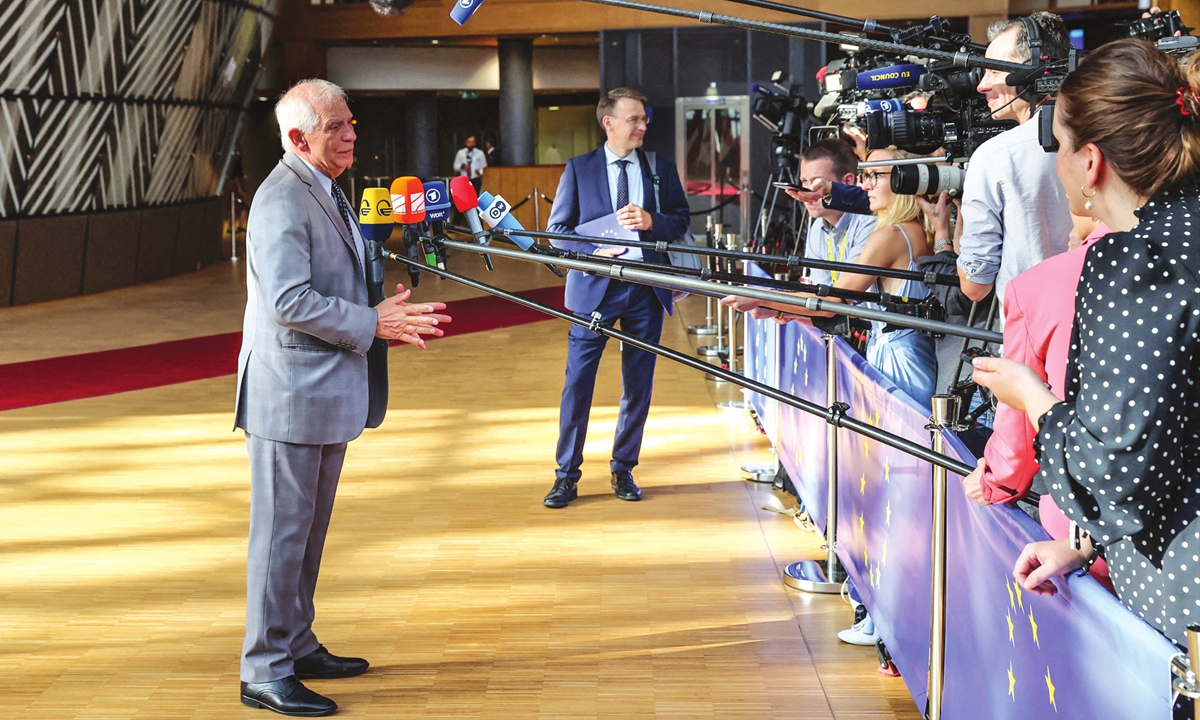
European Union High Representative for Foreign Affairs and Security Policy Josep Borrell Fontelles speaks to the press before a meeting of EU foreign ministers at the European Council in Brussels on July 18, 2022. Photo: AFP
Highlighting China's challenge and competition would exert a negative impact on the political atmosphere and economic cooperation between China and Europe, which will not benefit the European Union (EU) to stamp out its problems, Chinese experts said, following EU foreign policy chief Josep Borrell's recent remarks that the EU should treat China more as a competitor and reduce economic dependence on Beijing, in the run-up to a two-day summit in which EU leaders are expected to discuss a "fine-tuning" of ties with Beijing.
Speaking after an EU meeting in Luxembourg on Monday, in which EU foreign ministers discussed China for the first time this year, Borrell said that China's role as a "competitor" had became more central among the three-pronged concept of "a partner, tough economic competitor and systemic rival" EU codified in 2019.
According to a five-page report for EU members from European External Action Service which Borrell heads, the bloc is called on to toughen its attitude toward China, "an even stronger global competitor for the EU, the US and other like-minded partners," the Financial Times said. As for potential cooperation with China, the document only includes areas of climate change, the environment and health, media reported.
The meeting in Luxembourg is seen as preparation for a debate on China by the 27 EU leaders at a summit that begins on Thursday in Brussels, in which the EU may "fine-tune relations with Beijing," according to a Reuters report.
The EU's potential attitude switch came after Washington formally recognized China as its "most consequential geopolitical challenge" in the
Biden administration's national security strategy. Therefore, some analysts view the EU's move as a loyal "roger that" echoing to the US' latest national strategy.
Wang Yiwei, director of the Institute of International Affairs at the Renmin University of China, told the Global Times on Tuesday that the US pressure on Europe to release a report following Washington's national strategy may be a reason for the EU politicians' move, but listing China as a "tougher competitor" cannot solve their systemic and fundamental problems, like issues of security, energy, declining advantages of traditional manufacturing, slow digital transformation, and rising populist and social divisions.
The emphasis on competition with China means that the EU will no longer value its role in solving global problems, which needs more cooperation with China, Wang said. "But seeking to reduce dependence on China, for example in raw materials and manufacturing, does not represent an increase in Europe's strategic independence, because it would simply mean relying on other countries and increased costs."
Europe's politicians nowadays are better at venting emotions and transferring contradictions… In terms of pushing through reforms, there is no one as capable as Angela Merkel, who knows how to manage relations with China and Russia, so Germany has prospered for so many years, Wang said.
On Monday, Borrell said that the Europe should reduce its dependency by diversifying supply chains for technologies and raw materials on China, given its "vulnerability" from the Russian energy supply. But in fact, Borrell admitted earlier at the EU Ambassadors Annual Conference 2022 on October 10 that the EU's prosperity was based on cheap energy from Russia and Chinese market and workers.
Cui Hongjian, director of the Department of European Studies at the China Institute of International Studies, told the Global Times on Tuesday that Europe, facing the risk of recession, would be going against its own interests to emphasize competition and reduce cooperation.
Although reinforcing competition with China has not yet been implemented into a specific system, the signals sent by Western politicians will obviously have a negative impact on the political atmosphere between China and Europe and on economic and trade cooperation in some areas, given that China has been sincerely emphasizing the need to maintain stability and cooperation in China-EU relations, Cui said.
Cui noted that given the differences in European countries' relationship with China, their demand for the Chinese market, and their views on the benefits of cooperation with China, Thursday's discussions among EU leaders, as well as the specific policy implementation in each European country, the process of balancing and rebalancing as a real consensus will be hard to achieve.
Just a week ago, EU trade commissioner Valdis Dombrovskis said at a conference in Berlin on October 11 that decoupling from China is "not an option" for EU companies, Reuters reported. Dombrovskis stressed that EU should continue engaging with China with pragmatism and without naivety.
Also on October 11, German Chancellor Olaf Scholz said decoupling from China would be the "wrong answer," as "globalization has been a success story that enabled prosperity for many people."
Chinese Foreign Ministry spokesperson Wang Wenbin said at a press briefing on Monday that China and the EU are partners, not rivals, calling for the EU to view China-EU cooperation in an objective manner, expand common interests and contribute to the stability of global industrial and supply chains.




